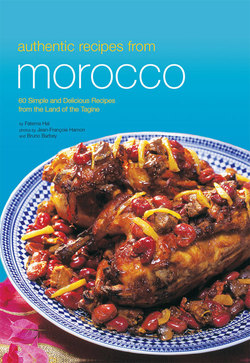Читать книгу Authentic Recipes from Morocco - Fatema Hal - Страница 8
На сайте Литреса книга снята с продажи.
ОглавлениеDesert-dwelling nomad women prepare couscous, the national dish of Morocco.
Women and Dadas
Moroccan cuisine is essentially a feminine art
In Morocco, cuisine is first and foremost women’s business. In Moroccan culture, men are strongly advised to stay away from ovens, or risk losing their virility.
Morocco is a country of oral tradition, even though progress and education are gradually reaching across the immense territory. Here, knowledge, culinary or otherwise, is dispensed by word of mouth, from mother to daughter. So, should you be invited into a Moroccan home and the mistress of the house allows you free reign after the indispensable mint tea ceremony, you will not see any books on the subject of food and you will certainly not find any recipe books.
We have seen that Morocco is rich in its varied populations. The Berbers were the first inhabitants. Several ethnological studies have shown that Berber women worked the land, harvested, picked, and did the cooking themselves. Clearly our culinary roots go back to cultures from pre-Islamic times (North Africa was the larder of the Roman Empire) and can be traced to local savoir faire. Since that time, Morocco has had close commercial ties with countries in the south of the continent; sub-Saharan Africa provided gold, salt, and slaves. Trade reached its height under the green banner of Islam and became a flourishing commerce that affected the whole society including the cuisine.
Brutal import of servant populations was quickly replaced by peaceful solutions, and it was usually through trade that abundant supplies of slaves were sent to the market of Dâr al-Islam, the house of Islam. In Morocco, male and female slaves came primarily from Sudan. Many had been bought by Touareg traders for a few pieces of gold and some scraps of fabric; others had simply been rounded up on the banks of the Niger. They instructed the captives in the rudiments of Arabic and the principles of Islam (which increased their market value) before leading them to Moroccan markets where they were sold.
Mouloud, one of the most important Muslim holidays, celebrates the birth of the prophet Mohammed. It is marked by processions, dancing, and feasts.
We do not know much about the living conditions of the first sub-Saharan African slaves. Observers conclude that, at least after the nineteenth century, they did not suffer at the hands of their employers. The masters even tended to be more humane with sub-Saharan African slaves because though originally pagan, they quickly chose to convert to Islam.
Female slaves, known as dadas, quickly became indispensable, and were even given the charge of young children, for whom their dadas remain an indelible memory. Bound to slavery during the lifetime of their masters, some of the dadas stayed on in the house of the heirs when the latter died, to continue doing what they did as slaves, though henceforth as free women.
Almost all female slaves were destined to perform domestic tasks. However, through the attention of a merchant or a rich master, a few, thought to be good learners, received a thorough education in music or even literature, before being sent to the harems of many an Orientalist’s fancy.
Qualified cooks were sold for very large sums. Restrictive and strict regulations were set so that the cooks’ instruction conformed to the wishes of the palace. Over the course of several years, the cooks were fed, housed, and trained until they perfected their knowledge and skill. The training period was crowned by a sort of diploma, a certificate with the slave’s name and her culinary aptitudes. It comes as no surprise that these slaves commanded such high prices.
Other than the original contributions from Berber culture, Moroccan cuisine is largely made up of the heritage of the dadas whose numbers are now dwindling. The height of irony is that these women whose only wealth was their status as a slave have become the masters of an inestimable, delectable treasure. When a dada is no more, a whole chapter of our culinary heritage is lost. To borrow the words of African writer Hampaté Bâ: “When one of them passes away, it is a library burning.” It has become urgent to record all the recipes and kitchen hints of these women in order to preserve their memories, which have been jealously guarded in household kitchens.
Heiresses to an ancient knowledge, these women have acquired real power in the home. It has been one of the only means at their disposal to demonstrate their competence and the hours they have spent tending their ovens may soon be lost forever, as will a part of our culinary memory.
The great tradition of street food is perpetuated by the women of Morocco.
